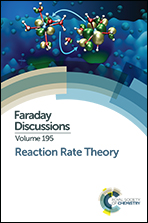Effective dynamics along given reaction coordinates, and reaction rate theory
Abstract
In molecular dynamics and related fields one considers dynamical descriptions of complex systems in full (atomic) detail. In order to reduce the overwhelming complexity of realistic systems (high dimension, large timescale spread, limited computational resources) the projection of the full dynamics onto some reaction coordinates is examined in order to extract statistical information like free energies or reaction rates. In this context, the effective dynamics that is induced by the full dynamics on the reaction coordinate space has attracted considerable attention in the literature. In this article, we contribute to this discussion: we first show that if we start with an ergodic diffusion process whose invariant measure is unique then these properties are inherited by the effective dynamics. Then, we give equations for the effective dynamics, discuss whether the dominant timescales and reaction rates inferred from the effective dynamics are accurate approximations of such quantities for the full dynamics, and compare our findings to results from approaches like Mori–Zwanzig, averaging, or homogenization. Finally, by discussing the algorithmic realization of the effective dynamics, we demonstrate that recent algorithmic techniques like the “equation-free” approach and the “heterogeneous multiscale method” can be seen as special cases of our approach.
- This article is part of the themed collection: Reaction Rate Theory

 Please wait while we load your content...
Please wait while we load your content...